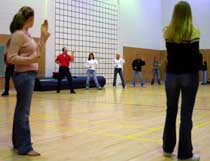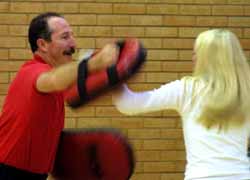Resources are readily available during Red Zone
The start of fall semester marks the beginning of Red Zone, and various organizations on campus and in the community are making an effort to spread awareness and prevention of rape and sexual assault.
The Red Zone is the time period between the start of the school year and Thanksgiving Break when women are at the highest risk for sexual assault.
“In football, the red zone is often referred to as the last 20 yards before a touchdown,” said Janet Osborne, Women’s Center for Lifelong Learning director. “In the zone, it’s a critical time to make great gains or great losses, much like the Red Zone is a critical time on college campuses when women, especially freshmen women, are most at risk for sexual assault or date rape.”
Osborne said women are especially susceptible during Red Zone because moving to a new and larger environment with different people means there are numerous decisions to be made that a person isn’t always prepared to deal with.
So far this semester, activities have included women from Greek organizations distributing Red Zone information kits, and a panel of male students from Utah State University, including athletes and fraternity members, discussing topics relating to rape and sexual assault and how men are affected.
Osborne said rape is not just a women’s issue, so men need to take action by acknowledging they are part of the problem. She said men should talk to each other about their responsibility in speaking out against rape, examining their own assumptions of women and the status of women, and being active in coming up with solutions.
“Twenty percent of [rapists] are responsible for 80 percent of the rapes,” Osborne said. “That tells us it is the same men over and over that commit rape. That is why men should speak up and not tolerate this behavior from other men.”
This year, USU made progress in providing services for victims by starting Sexual Assault and Anti-Violence Information (SAAVI), located in the USU Student Health Services.
SAAVI is a new resource controlled by a coordinator for students who have been raped or sexually assaulted.
According to information provided by SAAVI, “The USU SAAVI coordinator will assist the victim by providing support and information on medical, counseling, academic, and legal aid in the aftermath of a sexual assault.”
Currently, the university is looking for someone to fill the position of coordinator.
Osborne said that as the campus has grown larger over the years, it has created a larger likelihood of individuals being sexually assaulted, and an increased demand for a specific person and office like SAAVI to handle the
situation.
The SAAVI resource team includes people from the Counseling Center, USU Campus Police, the Women’s Center, Aggie Intercollegiate Athletics, Residence Life, Student Health Services and the Student Wellness Center.
The office also has an alliance formed with Community Abuse Prevention Services Agency (CAPSA) and the Sexual Assault Response Team (SART). CAPSA is the local rape crisis center which offers free and confidential services to both primary survivors, the individuals who are directly affected, and secondary survivors, those who are close to the primary survivor, said rape crisis coordinator Jenny Aguilar.
In addition to a 24-hour crisis team that provides intervention services to survivors at the clinic hospital and police station, they also offer sexual assault support groups and individual counseling, she said.
“SAAVI is a really good collaborative network because there are people who deal with this involved who bring certain dimensions, so that there is a wide range of advocacy, support, and information available. However, the key will be the coordinator to manage it to make all of us more effective,” Osborne said.
Campus police Sgt. Shane Sessions said prevention is also key. The USU Campus Police offers an escort service seven days a week, 24 hours a day for anyone who wants to be accompanied anywhere on campus.
Campus police Lt. Steve Milne said although it is important to avoid areas that are not very well lit or with a lot of shrubbery, a person’s residence also poses a threat, because date/acquaintance rape accounts for the majority of sexual assaults in Cache Valley.
“The safest places are anywhere on campus,” Milne said. “The most dangerous place on campus is yours or their own bedroom.”
Osborne said it is important for women to have strategies ahead of time for dating, sexual boundaries and skills to communicate what the sexual parameters are in order to prevent miscommunication.
Another prevention tactic available is Rape Aggression Defense (RAD), a women’s self defense program offered by 4,000 instructors in the United States and Canada with both education and hands-on training.
USU offers the course as a one-credit class or a non-credit night course.
Sessions, who teaches the course, said he stresses the importance of interactive defense training.
“When the human brain is confronted with a dangerous situation, it will do one of three things,” Sessions said. “It will fight to protect itself, run away, or freeze.
“Once the brain has become trained by punching, kicking and scenarios when they are confronted with an actual attack, the brain will start to fight.”
Leia Tyndall, a junior wildlife biology major, took the RAD course in the spring and said the knowledge she attained from the class makes her feel safe.
“I think it makes me feel more confident that I will at least be able to face situations that are troubling,” Tyndall said. “I know what to do now, and it reminded me of common sense things and things that I hadn’t learned before. Half of the class time is learning how to avoid bad
situations.”
Milne said one of the best preventative measures a woman can take is to listen to herself.
“Pay attention to that gut feeling,” Milne said. “[Victims] get all of these little red flags before it happened. Listen to those feelings and act on them.”
Sophomore Marie Pehrson, an accounting major, said the efforts made by the university help her feel safe.
“I feel safe because I haven’t had any problems so far and because the campus takes a lot of safety precautions and they try to make everyone aware, by having booths and police escorts,” she said.
According to the campus police statistical report, only one rape and five sexual assaults were reported during the 2002 school year.
Milne said this number can be misleading because many victims do not report.
According to Rape, Abuse and Incest National Network (RAINN) less than 39 percent of sexual assaults are reported to law enforcement.
Milne said reasons for this include the intimidation factor of reporting to a male officer, both the university and Logan Police Department, however, have a female officer available at the victim’s request. Also, victims fear repercussions of the illegal activities they may have been participating in, like underage drinking at the time of the incident. Time is also an important commodity, so delays in reporting can hurt.
Director of the USU Counseling Center Mary Doty, said there are other emotional reasons for not reporting, including shame and embarrassment.
“A lot of that has to do with cultural misperceptions about how responsible the woman is for a sexual assault. Also, she might fear some sort of retaliation from the perpetrator or from friends or family or a social network that doesn’t believe her,” she said.
The counseling center also provides free one-on-one counseling to students.
Even if a victim does not want to press charges, Milne said it is still beneficial to report the incident to authorities because it makes the department aware of the problem and also reveals if the perpetrator has had a background. In addition to notifying the police to document the incident, the v
ictim also has the option of proceeding with a complete investigation, or having the police speak to the accused without pressing charges.
Judicial officer Dallin Phillips said as long as the accused is a student, there is the option of taking disciplinary action through the university Judicial Board composed of four students, one faculty member and one professional staff member.
Phillips, who oversees the board, said the hearing differs from a courtroom because the public does not have access and not all of the rules of evidence apply. A lawyer may be present only to advise, but they may never speak. Both parties state their side of the story, and witnesses can be used in the hearing. The hearing date is usually set within seven to 10 days, unlike in the courts which can take months.
“One thing I would stress is to go through the courts, but at minimum, through campus because its much faster. Secondly, its not nearly as stressful of a hearing on the victim. It’s a closed hearing. There aren’t the formal rules of evidence and the burden of proof is much slighter,” Phillips said.
While each case varies, Phillips said, typically if found guilty of sexual assault, the perpetuator would receive a minimum punishment of expulsion.
The accused can also be removed from campus until the hearing for the victim’s safety.
Aguilar said it is important for all to educate themselves on the issues of sexual assault not just for personal safety but for others.
“When someone you know discloses that they have been raped, it is pretty common for many to not know what to say or how to help. Education is the key in understanding how to offer the support a rape survivor needs,” she said.
-mspradling@cc.usu.edu

The Rape Aggression Defense class is taught by Officers Shane Sessions and Joe Huish of the Utah State University Campus Police Department. Only females are allowed to sign up for the class. A new class will be starting on Sept. 17 at the Lundstrom Student Center.

Ashlee Moulton, an undeclared freshman, blocks a punch from Joe Huish, instructor of the Rape Aggression Defense class. (Photos by John Zsiray)

